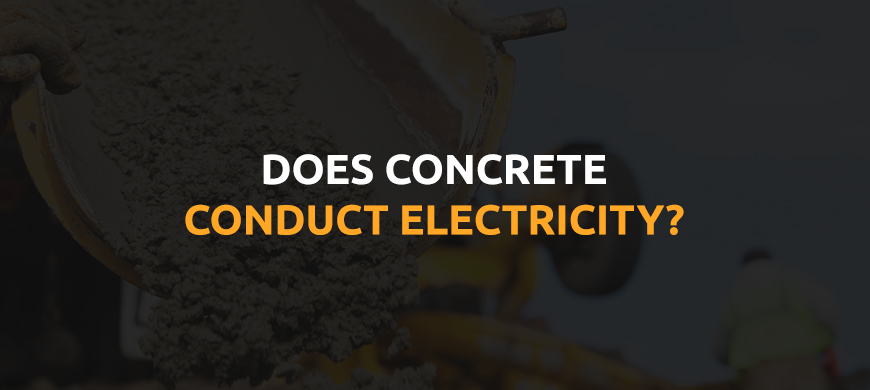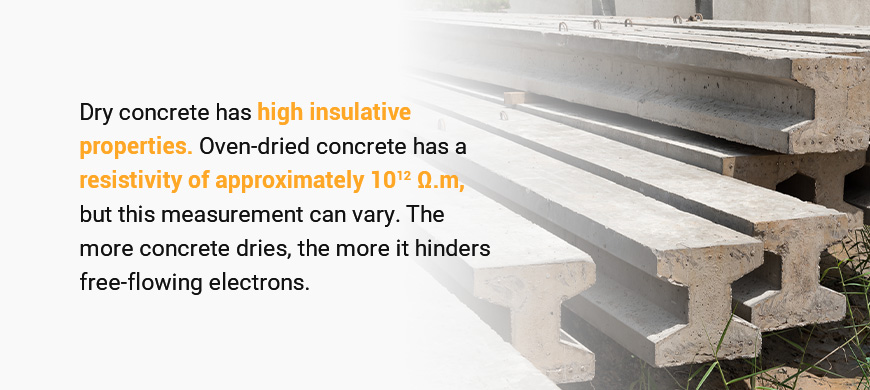
Does Concrete Conduct Electricity?
Posted By:Dynamic Concrete Pumping , Date: Nov 27, 2020

-Updated 5/16/23
Concrete can conduct electricity, but it has limited conductivity. You cannot depend on concrete to transmit electrical currents, but you should always use caution around concrete and wet cement when exposed wires are nearby. Learning how electrical conductivity and resistivity work can help you understand concrete’s conductive and insulative properties.
What Is Electrical Conduction and Insulation?
Electrical conduction and insulation measure how easily electrons can travel through various materials. Electricity can easily pass through highly conductive materials because the atoms and electrons are loose and have plenty of space to move.
Insulators block or slow electrical currents, making them tightly packed and immobile. Insulative materials restrict free-flowing electrons from moving and stop electrical currents from traveling.
Does Concrete Conduct Electricity?
You might find different answers to whether concrete can conduct electricity or not. The variation in responses is because the electrical conductivity of concrete varies and is typically low. While concrete can conduct electricity, it is not the best conductor of electricity. Concrete is a much better insulator and can significantly slow electrical currents because of its insulating capabilities.
The conductivity of concrete depends on its composition. Concrete is made up of several different materials, including the following:
- Aggregates: More conductive aggregates increase concrete’s conductivity. For example, black steel slag is an aggregate that comes from steel production waste and is more conductive than other aggregates. Concrete is slightly more conductive when it contains black steel slag.
- Water: Concrete’s wetness affects its electrical resistance. Wet concrete is more conductive, while dry concrete is more resistant.
- Cement: Cement is not a good conductor. However, cement’s electrical conductivity depends on its porosity, which depends on its moisture content. More porous cement can conduct electricity easier than cement with low porosity. As cement dries, its pores reduce in size and increase in resistivity, making it less conductive.
Factors like these can cause the electrical properties of each block of concrete to vary widely. In general, however, concrete functions better as an insulator than as a conductor. Concrete often contains ions such as aluminum, sulfur, calcium and silicon, but these ions have low electrical conductivity.
Rebar can also increase concrete’s conductivity. If you reinforce a concrete structure with steel rebar, the steel’s high conductivity increases the structure’s ability to transmit electricity.
Conductors Versus Insulators
Conductors and insulators differ in how they help or hinder the movement of electricity. Conductors have very little electrical resistance, while insulators have significant resistance and can block electrical flow. Conductors and insulators have unique purposes and are necessary for different situations.
A cable, for example, might have a metal wire inside to transfer electricity and an insulating jacket to keep the electricity from reaching other conductive objects. Electricians often use rubber protective equipment, and construction workers use non-conductive ladders to stop themselves from becoming part of an electrical circuit and prevent electric shock.
You can determine whether a material is a conductor or an insulator by measuring its resistivity in ohm meters (Ω⋅m). A high number indicates poor conduction properties and a good insulator. Conductors typically have a resistivity of between 10-2 and 10-8 Ω⋅m, while insulators reach between 1011 and 1019 Ω⋅m. The areas between these numbers constitute semiconductors with moderate levels of conduction.
Consider the following common building materials’ resistivity measurements:
- Copper: Copper is a very strong conductor, with a resistivity of 1.68×10-8 Ω⋅m.
- Glass: Glass is an insulator, and its resistivity is less than 107 Ω⋅m.
- Silicon: Silicon sits in the middle at 6.40×102 Ω⋅m.
Every material has some level of conductivity, but where it sits relative to others determines its usefulness.
Is Concrete a Good Conductor?
Electricity can travel through concrete, but how well it travels through concrete depends on its resistivity. Some concrete can transmit electricity because its chemical components contain free ions. However, these ions have low conductivity.
Concrete’s resistivity is tough to measure due to its differences when wet and dry and the wide variety of its chemical makeup. Some aggregates behave differently than others, and concrete pores can create additional variation.
Moist concrete has higher conductive properties than dry concrete. Concrete reaches a semiconductor status when it’s wet, and moist concrete’s resistivity is approximately 105 Ω⋅m. Wet concrete has a lower resistivity and can conduct electricity slightly because free ions can move freely through water molecules.
Concrete’s conductivity also depends on its thickness and temperature. For example, a 5-inch concrete wall is slightly more conductive than a 10-inch concrete wall because the thicker wall contains more concrete to block electrical currents before they pass through. Additionally, high temperatures increase electron movement, so warmer weather can make a concrete structure slightly more conductive than it is in colder weather.
Despite concrete’s low conductivity, current can pass through cement. It will still conduct some electricity and is a better conductor than other nonmetal materials like glass. Still, you don’t want to depend on it to complete a circuit.
Is Concrete a Good Insulator?
Dry concrete has high insulative properties. Oven-dried concrete has a resistivity of approximately 1012 Ω⋅m, but this measurement can vary. The more concrete dries, the more it hinders free-flowing electrons. While adding water can increase concrete’s electrical conductivity, keeping it dry makes it an excellent insulator.
Since concrete’s thickness affects its conductivity, it also affects its resistance. The thicker a wall or concrete structure is, the better it blocks electrical currents.
Does Concrete Provide Protection From Electrical Shock and Lightning Strikes?
Concrete is a poor electricity conductor, but it can transmit some current. You should always use caution near wet concrete and keep exposed electrical wires and open-ended cables away from the concrete. High voltages can travel through wet or hot concrete, increasing the risk of electric shock.
You can install grading ring conductors around concrete slab edges to prevent electrocution if a structure contains any hazardous electrical wiring. Following manufacturer guidelines and local standards is also important when using or installing electrical equipment in concrete buildings.
Lightning can pass through metal components within concrete walls and floors. Wires and metal bars inside concrete can transmit electricity, so avoiding water and plumbing during lightning threats is crucial.
What Materials Are the Best Electricity Conductors?
Materials with the best electrical conductivity allow electrons to move freely. You can expect the best conductivity from the following materials:
- Silver
- Aluminum
- Copper
- Gold
- Nickel
- Zinc
- Brass
- Iron
- Bronze
- Carbon steel
- Lead
Trust Dynamic Concrete Concrete Pumping, Inc. With Your Project Needs
Concrete can conduct electricity slightly in certain conditions, but it is more insulative than conductive. Understanding concrete’s conductivity and the factors that affect it can help you make the best decisions for your projects. Dynamic Concrete Pumping offers comprehensive commercial concrete services to meet your needs.
Our experienced team performs concrete pumping and pouring, placing and finishing, grinding and polishing and superflat floor installation. We also offer concrete pumping equipment from industry-leading manufacturers. Contact us to learn more about our services and equipment.



